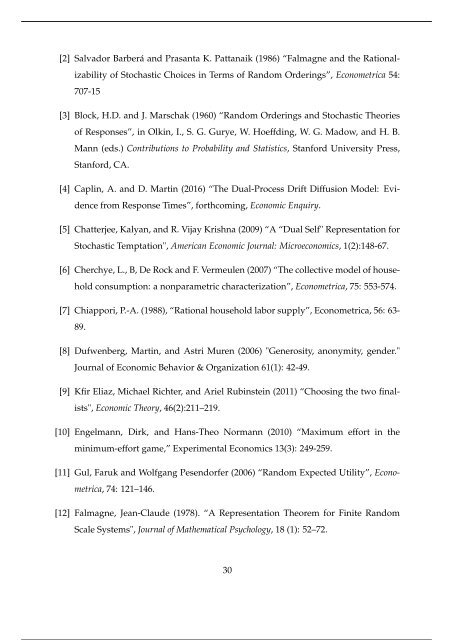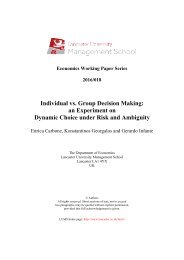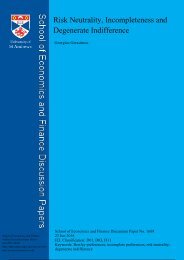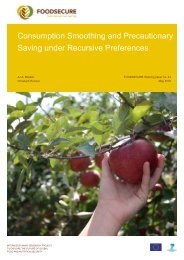Dual Random Utility Maximisation
n?u=RePEc:san:wpecon:1605&r=upt
n?u=RePEc:san:wpecon:1605&r=upt
Create successful ePaper yourself
Turn your PDF publications into a flip-book with our unique Google optimized e-Paper software.
[2] Salvador Barberá and Prasanta K. Pattanaik (1986) “Falmagne and the Rationalizability<br />
of Stochastic Choices in Terms of <strong>Random</strong> Orderings”, Econometrica 54:<br />
707-15<br />
[3] Block, H.D. and J. Marschak (1960) “<strong>Random</strong> Orderings and Stochastic Theories<br />
of Responses”, in Olkin, I., S. G. Gurye, W. Hoeffding, W. G. Madow, and H. B.<br />
Mann (eds.) Contributions to Probability and Statistics, Stanford University Press,<br />
Stanford, CA.<br />
[4] Caplin, A. and D. Martin (2016) “The <strong>Dual</strong>-Process Drift Diffusion Model: Evidence<br />
from Response Times”, forthcoming, Economic Enquiry.<br />
[5] Chatterjee, Kalyan, and R. Vijay Krishna (2009) “A “<strong>Dual</strong> Self" Representation for<br />
Stochastic Temptation", American Economic Journal: Microeconomics, 1(2):148-67.<br />
[6] Cherchye, L., B, De Rock and F. Vermeulen (2007) “The collective model of household<br />
consumption: a nonparametric characterization”, Econometrica, 75: 553-574.<br />
[7] Chiappori, P.-A. (1988), “Rational household labor supply”, Econometrica, 56: 63-<br />
89.<br />
[8] Dufwenberg, Martin, and Astri Muren (2006) "Generosity, anonymity, gender."<br />
Journal of Economic Behavior & Organization 61(1): 42-49.<br />
[9] Kfir Eliaz, Michael Richter, and Ariel Rubinstein (2011) “Choosing the two finalists",<br />
Economic Theory, 46(2):211–219.<br />
[10] Engelmann, Dirk, and Hans-Theo Normann (2010) “Maximum effort in the<br />
minimum-effort game,” Experimental Economics 13(3): 249-259.<br />
[11] Gul, Faruk and Wolfgang Pesendorfer (2006) “<strong>Random</strong> Expected <strong>Utility</strong>”, Econometrica,<br />
74: 121–146.<br />
[12] Falmagne, Jean-Claude (1978). “A Representation Theorem for Finite <strong>Random</strong><br />
Scale Systems", Journal of Mathematical Psychology, 18 (1): 52–72.<br />
30






